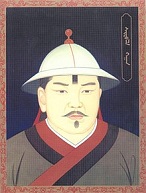


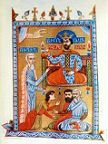


1320 On Mar. 1 emperor #4 (since Apr. 7, 1311) Buyantu Khan (Yuan Ren Zong) (b. 1285) dies, and on Apr. 19 his eldest son Shidebala becomes Geegan ("enlighttened") Khan (Yuan Ying Zong) (1302-23), Mongol Yuan emperor #5 of China (until Sept. 4, 1323). In Mar. after Paduan lord (since 1318) Jacopo da Carrara resigns in favor of Henry III of Gorizia instead of him, pissed-off Ghibelline condottiero Cangrande (It. "big dog") (Can Francesco) I della Scala (1291-1329) (patron of Dante) begins attacking Henry III's castles in the Treviso area, then in June attacks Padua with the help of Paduan exiles, causing Henry II to attack him on Aug. 2 in Bassanello with fresh troops and overwhelm him, causing him to flee to his stronghold in Monselice with an arrow sticking in his thigh, then agree to give up on Padua. In Apr. the Declaration of Arbroath AKA the Scottish Declaration of Independence is drawn up for Robert I by chancellor Bernard of Kilwinning (-1331), abbot of Aberbrothick to urge Pope John XXII to give up the excommunication thingie and accept Scottish independence, along with "our most valiant prince, king and lord, the lord Robert", Scottish champion against England; "For as long as one hundred of us shall remain alive we shall never in any wise consent to submit to the rule of the English, for it is not for glory we fight... but for freedom alone"; strongly influenced by the Templars, the declaration claims descent from the Lost Tribes of Israel, and rids Scotland of serfdom; 25 (almost all of the) lords and bishops of Scotland, incl. the Sinclairs of Rosslyn are signatories; after advancing the clincher that it's the English not the Scots who are failing to on Crusade, in Aug. the pope goes for it and lifts the excommunication; too bad, Edward II sends his own emissaries to the pope, getting him to flop back and forth. On May 5 the Peace (Treaty) of Paris between Count Robert III of Flanders and Philip V of France is signed by Count Robert of Bethune, ending a war begun during the brief reign of John I; Philip V of France acquires some Flemish territory. In May a French shepherd boy in Normandy has a revelation or vision, beginning the Shepherds' Crusade; 30K Christian shepherds set out to attack the Muslim Moors in Spain, change their minds when they see they can fight back, do what comes natural, and begin ravaging defenseless Jewish communities in S France and N Spain incl. Saintes, Verdun-sur-Garonne, Cahors, Albi, Toulouse, and Montclus before they are finally dissolved? On July 20 Oshin I (b. 1282) dies (poisoned?), and his 11-y.-o. son Levon (Leon) (Leo) IV (1309-41) becomes king of Lesser Armenia (Cilicia) (until 1341). On Aug. 4 the Black Parliament of Scotland tries the principals in the Soules Conspiracy to kill Robert I and place Edward Balliol on the Scottish throne to prevent English rule, convicting William II Soules (Soulis), Lord of Liddesdale (-1321) (Butler of Scotland), Sir Ingram d'Umfraville, and other ex-Balliol supporters, then having them "hangit and heidit", imprisoned or exiled; Sir Robert Bruce (-1332), illegitimate son of Robert I is created Lord of Liddesdale; Soules dies next Apr. 20 under mysterious circumstances in Dumbarton Castle. Cracow prince (since 1305) Wladyslaw (Vladislav) (Ladislaus) I Lokietek (the Short) (the Elbow-High) (1261-1333) regains control of Poland, and crowns himself king of Poland (until 1333); the feudal disintegration of Poland ends. Eric VI, Denmark's last strong king in a while dies, and his brother Christopher II (1276-1332) is elected king of Denmark (until 1326, then 1329-32) after the first-ever capitulation in Danish history, accepting limits on royal power in favor of the nobles and clergy; meanwhile the German Hansa towns of the Hanseatic League have acquired a monopoly of Danish trade and begin to dominate Danish politics. Pakistani Sufi Sultan Mubarak Khilji of Delhi dies. The city of Bialystok (Belostok) ("white slope") on the Bialy River (100 mi. NE of Warsaw) in NE Poland (modern-day pop. 297K/430K) is founded by Lithuanian Count Gedimin, becoming the largest city in NE Poland. Lyublyana in Slovenia receives civic rights. The ancient Gaulic capital of Lyon(s), France receives a municipal charter along with a coat of arms. The U. of Dublin in Ireland is founded in connection with St. Patrick's Cathedral, but never receives an endowment, and limps along until Henry VIII shuts it down, after which it is reestablished in 1592. Art: Anon., Sir Lancelot of the Lake; a set of paintings in the great hall of the ducal tower of Siedlecin, Poland. Giotto (1267-1337), St. John the Evangelist. Simone Martini (1284-1344), Virgin and Child (Church of Santa Caterina, Pisa). Births: Portuguese king #8 (1357-67) Pedro (Peter) I (the Just) (the Cruel) (d. 1367) on Apr. 8 in Coimbra; 3rd and only surviving son of Afonso IV (1291-1357) and Beatrice of Castile (1293-1359); husband (1346-) of Ines de Castro (1325-55). Spanish Jewish leader Samuel ben Meir Abulafia (d. 1361). Serbian king (1365-71) Vukasin Mrnjavcevic (d. 1371) in Livno, Bosnia. Danish king (1340-75) Valdemar (Waldemar) IV Atterdag (Adderdag) (d. 1375); youngest son of Christopher II (1276-1332). Italian ruler of Milan (1327-78) (patron of Plutarch) Galeazzo II Visconti (d. 1378); son of Stefano Visconti (-1327) (brother of Matteo I Visconti) and Valentina Doria; brother of Matteo II Visconti (1319-55), Bernabo Visconti (1319-85), and Galeazzo II Visconti (1320-78); father of Gian Galeazzo Visconti (1351-1402); creator of the 40-day on-again-off-again quaresima wheel torture. French constable ("the Eagle of Brittany") Bertrand du Guesclin (d. 1380) near Dinan, Brittany. French philosopher (bishop of Lisieux) Nicole (Nicolas) Oresme (d'Oresme) (d. 1382) in Allegmane (Fleury-sur-Orne) near Caen, Normandy. Persian #1 lyric poet ("the Shakespeare of Persia") Shams-ud-Din Mohammed Hafiz (Hafez) (Arab. "person who memorizes the Koran") (d. 1389). English bishop of Winchester and chancellor of England William of Wykeham (d. 1404) (b. 1324?). Deaths: Turkish poet Yunus Emre (b. 1238) in Anatolia. Italian sculptor Giovanni Pisano (b. 1245). French surgeon-anatomist (Montepellier U.) Henri de Mondeville (b. 1260). Byzantine emperor (1294-1320) Michael IX Palaeologus (b. 1277) on Oct. 12 in Thessalonica; dies in grief after his son Andonicus III accidentally kills his brother Manuel. Chinese Yuan emperor (1285-1320) Ren Zong (b. 1285) on Mar. 1.

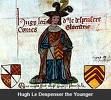


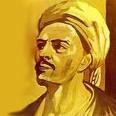

1321 On Oct. 29 Stefan Uros II Milutin (b. 1253) dies, and his son (maternal grandson of George I of Bulgaria, who as a youth had been sent as a hostage to Nogai Khan of the Golden Horde, then on his return made gov. of Zeta or Montenegro) Stefan Uros III Decanski (1285-1331) becomes king of Serbia (until Sept. 8, 1331). The original Pez dispensers? The Despenser War (ends 1322) begins when the Dispensers Hugh Despenser the Younger (1286-1326) and his father hugh Despenser the Elder, 1st Earl of Winchester (1261-1326) try to grab the Gower Peninsula, causing the marcher lords of Wales to form a confederation against them and ravage their lands, causing Parliament, at the behind, er, official behest of the Duke of Gloucester to demand their exile, which the king assents to only after Queen Isabelle finally goes down on her knees, er, dramatically begs her hubby Edward II to banish them from the kingdom, after which the elder flees to Bordeaux and the younger becomes a pirate on the English channel (until 1322); the first use of a Bill of Attainder in England is against the Despensers for supporting Edward II in his war with the queens and barons. King Philip V the Tall of France admits that the Jews are innocent of encouraging lepers to poison Christian wells, but only after 5K Jews have been murdered; Jews are required to wear yellow badges and forced to pay heavy fines for killing the Son of God and rejecting him as their Savior, thus insuring eternal Hellfire anyway? The Muslim Tughlak (Tughluk) Dynasty in N India is founded by Turkish shah Ghiyas ud-din (Ghiyath al-Din) Tughlak (Tughluk) (-1325), who defeats the Khaljis and ends the Khalji Dynasty (begun 1288), then as Gharzi Khan moves 4 mi. E from Delhi to his new capital of Tughlakabad (Tughlaqabad). Saarbrucken in W Germany receives a charter. Monte Cassino becomes a bishopric. The U. of Florence (originally the Studium Generale) in Italy is founded by the Repub. of Florence; in 1349 Pope Clement VI recognizes it, and it becomes the first Italian faculty of theology, becoming an imperial univ. in 1364; in 1473-1515 it moves to Pisa; the modern univ. is founded in 1859, and recognized by the Italian parliament in 1923. Architecture: The Gothic Palencia Cathedral (originally the Visigothic Crypt of San Antolin in 1172) is begun in Palencia, Spain (30 mi. NNE of Valladolid) (finished 1504). Nonfiction: Levi ben Gerson (1288-1344), Book of Numbers. Poetry: Dante Alighieri (1265-1321), The Divine Comedy (La Divina Commedia); "Turn, Beatrice, turn thy saintly sight on thy faithful one"; he stole the idea from Muhammad's Night Journey and Ascension to Heaven (Isra and Miraj)? - just in time for p lague victims to read about hell? Births: Scottish queen consort (1329-62) Joan(na) of the Tower (d. 1362) on July 5 in the Tower of London; youngest daughter of English king Edward II (1284-1327) and Isabella of France (1295-1358); first wife (1328-62) of David II (1324-71). Spanish Muslim scholar Ibn Juzayy (d. 1357). Deaths: Serbian king (1282-1321) Stefan Uros II Milutin (b. 1253) on Oct. 29. French writer Pierre Dubois (b. 1255). Italian lit. giant Dante Alighieri (b. 1265) on Sept. 14 in Ravenna (malaria?); buried in the Church of San Pier Maggiore (San Francesco), with the inscription "Florence, mother of little love" (written by his friend Bernardo Canaccio), after which Florence flip-flops and tries to get his body returned but is told to fork off, finally building an empty tomb for him in 1829 in the basilica of Santa Croce Church; leaves De Vulgari Eloquentia (Eloquio), the first postclassical treatise on poetic criticism (unfinished); his "Divine Comedy" is also apparently missing some parts, but his sons Jacopo and Pietro dream they see his ghost, who leads them to a hiding place in the wall where they find them, with a lawyer friend of Dante's as a witness?; in the 17th cent. his bones are hidden by monks to keep Florentine authorities from getting their hands on them, and in the 1920s measurements are taken of his skull; his face is portrayed as stern and frowning, with a hooked nose and prominent lower lip until 2007, when Pisa U. prof. Francesco Mallegni reconstructs his head and shows large eyes, rounded jaw, and gentler expression, although he still has a crooked nose, and is still "someone who would call a spade a spade": "Beauty awakens the soul to act." Swedish king (1290-1321) Birger (Berger) Magnusson (b. 1280) on May 31 in Denmark.




1322 A great cattle plague called the Mael Domnaig strikes Ireland (ends 1325). On Jan. 2 king (since Nov. 20, 1316) Philip V the Tall (b. 1294) dies, leaving a large number of royal ordinances but (poetic justice considering how he got the throne?) no male heir (only daughters Jeanne, founder of the House of Burgundy, and Margaret, founder of the House of Flanders), and his younger brother Charles IV the Fair (1293-1328) becomes the 15th and last king of the French Capetian Dynasty (begun 987), cutting off Edward III of England (grandson of Philip IV through his daughter Isabelle) (no fair?), which finalizes the no-cu, er, no-female-inheritance principle of the Salic Law as recursive; he kicks his reign off right by expelling the pesky money-grubbing Jews from France, who had been expelled in 1306 by Philip IV then allowed to return in 1315; meanwhile the French crown controls the papacy, and the rulers of the Capetian house of Anjou are still seated on the thrones of Naples, Provence, and Hungary; only Brittany, Flanders, Guienne, and Burgundy remain outside French royal control - what's left is a world where old friends suddenly become enemies? The original Army of the Twelve Monkeys? Early in the year Edward II of England recalls his indispensable Pez dispensers Hugh le Despenser Younger and Elder, renewing the Despenser War, now backed by English barons, led by the king's nephew Thomas Plantagenet, 2nd Earl of Lancaster (b. 1277) (eldest son of Edward I's brother Edmund Crouchback) (who had despised Piers Gaveston for calling him "the Fiddler", and was instrumental in getting him executed) at Pontefract, causing the king to take his army N to pursue Lancaster before he can hook up with the Scots; meanwhile in Jan. the 1319 truce with the Scots expires, and they see their chance and invade NE England, with Walter Stewart heading to Richmond, Thomas Randolph, 1st earl of Moray to Darlington, and Sir James "Black" Douglas to Hartlepool; on Mar. 11 Sir Roger d'Amory (b. 1290), an English veteran of the 1314 Battle of Bannockburn (who had been Edward II's favorite until displaced in 1318 by Hugh le Despenser the Younger, making him a bitter enemy of the Despensers) is captured by the king's forces at Tutbury Castle in Staffordshire after capturing Gloucester and burning Bridgenorth, and dies of illness on or before Mar. 14 before they can execute him; on Mar. 16 after the rebels find their path blocked by the forces of Sir Andrew Harclay (Hartley) (1270-1323), the Battle of Boroughbridge on the Ure River 20 mi. NW of York is a V for the king and the Despensers using the novel idea of mounted archers, and his key boy hunk Humphrey VIII de Bohun, 4th Earl of Hereford (b. 1276) KIA by a pike up his anus as he stands on the bridge, his screams causing his men to panic and run; on Mar. 22 after a kangaroo trial Thomas of Lancaster is beheaded at Pontefract Castle (20 mi. SW of York), after which Edward II reclaims his throne and makes Hugh Elder his counselor as well as earl of Winchester, and creates Harclay the earl of Carlisle; Lancaster's army is outlawed, while Lancaster is revered as a martyr and saint, becoming a possible source of the Robin Hood legend?; the laws passed in England during 1311 are repealed at the Parliament of York (containing burgesses and knights, as in 1311) on the basis that they were passed only by the nobles; the Despensers now dominate the king from both ends, beginning the Despenser Tyranny (ends 1326), where they run roughshod over the kingdom and grow rich, esp. at the expense of rich widows, while the younger Despenser becomes the de facto ruler of England, all of which is too much, and turns Isabelle against Edward completely (plus the fact that the younger Despenser raped her)?; meanwhile, although the Scots have returned to Scotland, the king takes their advice and invades Scotland, finding William the Wallace tactics in force, incl. destruction of all foodstuffs, compounded by plague, causing the Earl of Surrey, after one lame cow is finally scrounged up by the starving troops to issue the soundbyte "This is the dearest beef I ever saw; surely it costs a thousand pounds and more"; after destrying Holyrood Abbey near Edinburgh and then starting to return to English, with the Scots in pursuit, on Oct. 14 the "hare before greyhounds" Battle of Old Byland (Byland Moor) (Byland Abbey) in Yorkshire is a deja vu of the 1314 Battle of Bannockburn, with a giant Scot V, during which Queen Isabelle is abandoned by her hubby at Rievaulx Abbey along with his personal belongings, leaving her to escape on her own by a whisker, pissing her off at him more; the Scots now can raid the English borders at will - oh what a man that Wallace was, I wish I could've had a piece of him and been his woo-mun? On Sept. 28 German king and HRE (since Oct. 20, 1314) Louis IV of Bavaria (1282-1347), aided by King John of Bohemia and Frederick IV of Hohenzollern wins a decisive V at the Battle of Muhldorf (Mühldorf) (Ampfing) near Muhldorf am Inn on the Ampfing Heath; Frederick III the Handsome is captured along with 1.3K nobles from Austria and Salzburg, ending the 8-year civil war, and Bavaria beats Austria for the HRE crown; Handsome Fred is held in Trausnitz Castle for three years (until 1325) - AEIO oww? The Franciscans of Perugia in Italy revolt against Pope John XXII, and Franciscan friar William of Ockham takes a prominent part, getting imprisoned for 4 mo. then moving for protection to Munich, where he becomes a defender of Louis IV of Bavaria in his fight with the French popes; the pope condemns the doctrine of the apostolic poverty of the Church as a heresy, and sets the Inquisition on the Fraticelli, causing the Franciscan Order to begin a decline. Lithuanian grand duke Gediminas writes Pope John XXII asking for protection from the Teutonic and Livonian Knights, pointing out the privileges he has granted to the Dominicans and Franciscans to preach, and requesting legates to be sent to accept his conversion. Shamsuddin Firuz dies, and Bengal splits into two parts (E and W). The Persian Mongols under Abu Sai'd and his grand vizier Chupan sign the Treaty of Aleppo with the Mamluks, ending their invasions of Syria (begun 1260), and the Crusaders are out of luck about a Franco-Mongol alliance against them. After leaving Clonmel, Ireland on a pilgrimage to Jerusalem, Irish Franciscan monk Symon Semeonis (Simon FitzSimmons or FitzSimon and his companion friar Hugo the Illuminator encounter a group of Romany (Romani) (Roma) (Gypsy) from NW Ondia in Heraklion, Crete, calling themi "the descendants of Cain", becoming the first known encounter; he goes on to write Itinerarium Symonis Semeonis ab Hybernia ad Terram Sanctam (The Journey of Symon Semeonis of Ireland to the Holy Land). English knight John de Mandeville (-1372) (born in St. Albans) begins a journey to Egypt, the Holy Land, India, and China, serving 15 mo. in the army of the Mongolian great khan before returning in 1356. Gian Galeazzo Visconti closes the U. of Parma; after being created a univ. in 1412 by Niccolo III d'Este in 1412, it opens and closes several times during the next cent. Music: Pope John XXII pointedly counters Marchettus of Padua and bans the use of counterpoint in church music. Deaths: Dutch count of Flanders (1305-22) Robert II (b. 1249) on Sept. 17 in Ypres. Chinese painter Chao Meng-fu (b. 1254). French count of Nevers Louis I (b. 1272) on July 22 in Paris. English king-wannabe Earl Thomas of Lancaster (b. 1277) on Mar. 22 in Pontefract, Yorkshire (beheaded).


1323 On Mar. 3 after signing a peace treaty with Robert I the Bruce of Scotland without royal sanction, Sir Andrew Harclay (Hartley), Earl of Carlisle (b. 1270), who had been a big hero to Edward II last year, but found it impossible to stop the Scot raiding and had met with Robert I of Scotland to propose peace terms on his own is hanged, drawn, and quartered for treason by order of Edward II; that out of the way, Edward II of England his own truce with Robert I of Scotland, which only lasts four years, but causes the Despenser stock to go down with the public; Pope John XXII recognizes Robert I as king of Scotland. On Sept. 4 after instituting anti-corruption reforms and siding with the Tibetan Buddhists against Muslims, emperor (since 1320) Shidebala (Yuan Ying Zong) is assassinated, becoming the first Mongol ruler to be assassinated, and on Oct. 4 is succeeded by Yesun Temur, who becomes Yuan Tai Ding Di (1293-1328), Mongol Yuan emperor #6 of China (until Aug. 15, 1328). In Sept. king (since 1311) Saw O (b. 1283) dies, and Saw Zein (1303-30) becomes Hanthawaddy king #4 of Burma (until Apr. 1330), moving the capital N from Martaban (Mottama) to Pegu (Bago). On Oct. 16 count (since 1285) Amadeus V the Great (b. 1249) dies, and his eldest son Edward the Liberal (1284-1329) becomes count of Savoy (until 1329). In Oct. Lithuanian grand duke (1316-41) Gediminas (Gedymin) (1275-1341) is officially accepted into the Roman Catholic Church, and a compact is signed in Vilnius confirming it; too bad, the Teutonic Knights don't want Lithuania Christianized just yet, as they have their own designs, and after some shenanigans Gediminas is denounced by a synod of Prussian bishops in Elbing, causing him to refuse to see papal legates in Riga in Sept., keeping him from actually being baptized, and allowing him to play to the still large pagan constituency; the legates believe his assurances that he's really sincere, and forbid neighboring states to make war against him for the next four years; Gediminas moves the Lithuanian capital from Trakai to Vilna (Vilno) (Vilnyus) (Vilnius) on the Vilnia and Neris Rivers in SE Lithuania (modern-day pop. 545K/805K), where he builds Gedymin Castle; going on to house a large Jewish pop., causing it to be known as "the Jerusalem of Lithuania", and "the Jerusalem of the North" (Napoleon, 1812). Louis IV the Bavarian sends an army to protect Milan against the kingdom of Naples, Pope John XXII's strongest ally after France; meanwhile Pope John XXII excommunicates pesky Giovanni Visconti, who turns to antipope Nicholas V, who makes him a cardinal; he also pronounces false the proposition that Christ and his apostles had owned no property (which was approved by Pope Nicholas III in 1279), making the Spirituals (Zealots) of the Order of St. Francis into heretics, after which they are burned by the Inquisition. The Mamluks sign a peace treaty with the Ilkhanids (1328?). Louis IV the Bavarian gives the march of Brandenburg in NE Germany to his eldest son Louis V, and it begins to be ruled by princes of the Bavarian House of Wittelsbach (until 1373). Holland takes control of Zeeland in SW Netherlands. After the Battle of Skradin, Roman Catholic Stephen (Stepan) (Stjepan) II Kotromanic (-1353), AKA "the Devil's Student" becomes Hungarian ban (herzog) of Bosnia (until 1353); in 1326 his brother Prince Vladislav Kotromanic (-1354) becomes co-ban (until 1354), and they go on to work together to make Bosnia an independent state. John Darcy, 1st Baron Darcy de Knayth (1290-1347) is appointed lord justice of Norman Ireland (until 1344), making it a condition of his reappointment that there should be one and the same law (una et eadem lex) for the Irish and Anglo-Irish, except the betaghs (serfs), after which in 1331 it is codified in an ordinance, which the native Gaels ignore in favor of their brehon law. Pope John XXII canonizes Thomas Aquinas (1225-74) 49 years after his death; it takes until 1567 to make him a doctor of the Church - it's a dirty story of a dirty man, and his clinging wife doesn't understand? Giovanni Boccaccio (b. 1313) is sent by his father to Naples to study accounting, but is bored and switches to canon law, classical, and scientific studies, then begins partying in the court of Robert d'Anjou, whose illegitimate daughter Maria de Conti d'Aquino becomes his mistress and is immortalized in his writings as his "Fiammetta". The Consistori del Gay Saber (Academy of the Gay Science) lit. academy is founded in Toulouse, France, sponsoring poetry competitions among troubadours. Architecture: Oroshek (Orekhov) Fortress on Orokhovets (Swedish "nuts") Island is built by Novgorod Prince Yuri to guard the N approaches to Novgorod incl. access to the Baltic Sea; in 1702 it is renamed Shlisselburg (Schlusselburg) (Ger. "key fortress"). Births: Burmese Hanthawaddy king #8 (1348-83) Binnya U (d. 1384) on Jan. 2 in Pegu. Deaths: Savoy count (1285-1323) Amadeus V the Great (b. 1249) on Oct. 16 in Avignon. Burmese king (1311-23) Saw O (b. ?) in Sept. in Thadingyut.

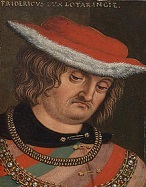




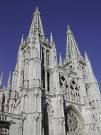
1324 Wallachia acknowledges Hungary as its overlord, but soon goes into revolt (ends 1330). English Franciscan friar William of Ockham (Occam) (1280-1347) (student of Duns Scotus) defines his Nominalist (anti-Realist) (Terminalist) philosophy at Pope John XXII's court in Avignon, incl. the cool Occam's (Ockham's) Razor (principle of economy of thought), toppling the dunce Schoolmen by separating logic from metaphysics with the claim that logic has nothing to do with ultimate truth, backing an experimental approach to science and even suggesting the law of inertia; after a catfight with Thomists in the 1320s, Ockham's school dominates European thought until the Protestant Reformation of the 1500s; meanwhile they don't buy it, and Pope John XXII excommunicates Ockham's friend HRE Louis IV the Bavarian. Sunni Muslim Mali king (mansa) #10 (1312-37)Musa Keita I (1280-1337) begins a pilgrimage to Mecca (ends 1326); his imperial household consists of 60K men incl. 12K slaves who each carry 4 lbs. of gold bars, and heralds dressed in silks bearing gold staffs, along with 80 camels carrying 50-300 lb. of gold dust each; in July he visits Egyptian maluk sultan AlNasir Muhammad; his total wealth is $400B, making him the richest human in history; his caravan is so opulently equipped with gold that it wows the world and causes the market for gold to plummet for a decade despite his attempt to borrow it back at high interest; he builds a mosque every Fri.; on his return journey he makes the rich city of Timbuktu (Tombouctou) ("Africa's city of gold") on the Niger River (pop. 100K) ("where camel meets canoe") part of his empire, hiring architects from Andalusia to build a grand palace along with the Djinguereber Mosque (1327). Catalonia occupies Sardinia. Cannons are used by the forces of Abu al-Walid Ismail ibn Nasr of Granda at the Siege of Huescar. Japanese emperor (since 1318) Godaigo (b. 1288) unsuccessfully tries to regain power from dissolute regent Tatatoki Hojo of the Kamakura shogunate. Sancho I (b. 1274) dies without an heir, and his nephew James III (the Rash) (the Unfortunate) (1315-49) (prince of Achaea since 1315) becomes the last independent king of Majorca (until 1344), but rashly refuses an oath of fealty to his cousin Peter IV of Aragon, who drives him out and annexes the Balearic Islands. After Charles IV builds a fortress illegally on Edward II's territory in Aquitaine, and the Despensers imprison Charles IV's sister Isabella of France, a French expedition is sent to Aquitaine. After the bourgeoisie of Metz, France incur a mountain of debts, the War of Metz (Four Lords' War) (ends 1326) sees Duke (since 1312) Frederick IV "the Fighter" of Lorraine (1282-1329) (nephew of Count Charles III of Valois), Bohemian king (since 1310) John (Jean) (the Blind) of Luxembourg (1296-1346), and archbishop-elector of Burgundy (since 1307) Baldwin of Luxembourg (1285-1354) organize a coalition to capture the city and make them pay; they're all of Merovingian blood? Oriel (King's) College at Oxford U. is founded by English king (1307-27) Edward II (1284-1327) as the College of the Blessed Mary, becoming the oldest royal foundation in Oxford; in 1329 a bldg. called La Oriole is presented to the college, causing the eventual name change by 1349 - smart choice for Edward II to found Oral College? Nonfiction: Marsilius of Padua (1270-1342), Defensor Pacis (Defender of Peace); first work of political theory to advance the idea of popular sovereignty and the conciliar movement, royally pissing-off the Avignon popes. Jean Pucelle (1300-55), The Hours of Jeanne de Evreux; tiny illustrated prayerbook made for the queen of France. Births: Scottish king (1329-71) David II (d. 1371) on Mar. 5 in Dumferline Abbey, Fif; eldest son of Robert I the Bruce (1274-1329) and 2nd wife Elizabeth de Burgh (1284-1327); his twin brother John dies in infancy and is buried at Restenneth Priory. English theologian and church reformer ("Morning Star of the Reformation") John Wycliffe (Wyclif) (OE "white cliff") (d. 1384) in Hipswell; makes the first complete trans. of the Bible into English from the Latin Vulgate, and founds the Lollards - hot hot hot? Greek Byzantine anti-Hesychast theologian-scholar-statesman and PM Demetrius Kydones (Cydones) (Demetrius Cydonius). (d. 1398) in Thesalonica; brother of Prochorus Cydones (1330-68); translator of Thomas Aquinas into Greek. Deaths: Italian Venetian Club Med East founder Marco Polo (b. 1254) on Jan. 9 in Venice; on his deathbed a priest tries to get him to recant his tall tales, but with his last breath he declares "I have not told half of what I saw": "I speak and speak, but the listener retains only the words he is expecting. It is not the voice that commands the story, it is the ear." Japanese Yamato emperor #91 (1274-87) Go-Uda (b. 1267) on July 16.




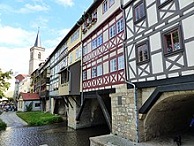
1325 On Jan. 7 king (since Feb. 6, 1279) Dinis I the Farmer (b. 1261) dies, and his son Afonso IV (1291-1357) becomes king #7 of Portugal (until May 28, 1357), getting into a 4-year war with Castile and scoring a big V against the Moors at the Oct. 1340 Battle of Rio Salado. In Jan. after paying off mercenary Henry VI of Carinthia to desert Padua, Cangrande della Scala attacks Padua again until Louis IV the Bavarian orders him to call a truce and give it back, which he might have done anyway when a great fire in Vicenza causes him to hurry back in July; meanwhile Frederick III the Handsome of Austria is released and made coregent of Germany by Louis IV the Bavarian, with his authority limited to Austria. Louis I of Nevers (1272-1322), count of Flanders, Nevers, and Rethel since 1322 is imprisoned by the communes under English influence (until 1326), pissing-off the French king and causing him to plan a campaign against the buggers, er, burghers. On Feb. 1 Ghiyas-ud-din Tughlak is murdered by his son Muhammad bin Tughluq (Mohammad Tughlak) (1290-1351) who succeeds him as sultan of Delhi (until Mar. 20, 1351), going on to expand S as far as the Deccan; too bad, he is so cruel and fanatical in his long reign that he alienates both the subject Hindus and his own Muslims, causing his empire to be torn apart by revolt, with some provinces, esp. Bengal bengalling out (seceding). On Mar. 13 after pressure by Duke Leopold I of Austria and a papal ban, plus the retreat of Bohemian king John of Luxembourg from his alliance, Louis IV the Bavarian finally signs the Treaty of Trausnitz, releasing his rival Duke Frederick III the Handsome of Austria in return for recognizing him as the legitimate ruler and promising to convince his brothers to do likewise; too bad, Leopold I doesn't convince, so that Freddy has to return to captivity even though Pope John XXII releases him from his oath, which causes a change in Louis IV, who renews his old friendship and lets him rule as joint HRE. Why Mexico's emblem is an eagle and a snake? On Mar. 13 after getting in trouble for sacrificing and skinning the daughter of a Culhua ruler and being driven by the Toltecs into the swamps of Lake Texcoco (pr. tesh-KOH-koh), where they found an eagle warming itself, its wings stretched out towards the rays of the sun, and eating a snake, the Mexica (Aztecs) found the city of Tenochtitlan (pr. teh-noch-TEET-lahn) ("stone prickly-pear place") (modern-day Mexico City, pop. 8.9M/20.4M) on a marshy island in Lake Texcoco, later expanding it by filling in the lake, which is linked to the mainland by causeways; they build fertile floating gardens in Xochimilco (pr. show-chee-MEEL-koh) outside the city, enabling them to free manpower for armies which set out to conquer everything from the Gulf to the Pacific to Guatemala; the soldiers carry spirolina high-protein algae as rations; they never invent the wheel (except as a kiddie toy) or use a beast of burden, but they love human meat and practice ritual sacrifice religiously, considering it an honor to sacrifice one's yollotl (heart). In Mar. after Pope John XII forces them to come to term with its citizens, peace is restored in Metz; next year the Peace of Herrings (named after their major food source after the lords block their trade routes) is signed in Ponit-a-Mousson, and the burgesses promise to not set up markets on their lords' fiefs without consent. On Sept. 22-23 the Battle of Altopascio in Tuscany, Italy is a V for the Ghibelline city of Lucca under Castruccio Castracani odegli Antelminelli (1281-1328) over the Florentine Guelphs, causing HRE Louis IV the Bavarian to appoint him duke. On Nov. 21 Ivan I Danilovich (Kalita) (1288-1340) becomes grand duke (prince) ("vladimir" = great ruler") of Moscow (until Mar. 31, 1340)), collecting taxes as a vassal of the Tartars, earning him the nickname Kalita ("moneybags"), then loaning it out at interest to get them in trouble and annex their lands; he goes on to move the capital from Vladimir to Moscow. In Nov. the Battle of Monteveglio sees the Guelphs of Bologna defeated by the Ghibellines under Passerino Bonacolsi of Mantua and Cangrande della Scala of Vicenza. The Teutonic Knights disregard the papal legates and resume their war with Gediminas of Lithuania, who allies with Wladislaus Lokietek of Poland after marrying his daughter Aldona to his son Casimir III. Songhay (Songhai) comes under the control of Mali. Isabella the She-Wolf of France finally gets the hot beef she wants? After Charles IV of France seizes Edward II's French possessions, definitely not-getting-much English Queen Isabella of France (1295-1358) is sent to negotiate peace with her brother, later tricking Edward into sending 13-y.-o. Edward III after her, while she hooks up with Roger Mortimer, 1st Earl of March (1287-1330), an ambitious exiled Marcher Lord, a mortal enemy of the Despensers (because his grandfather had murdered their grandfather?), who with her probable help had escaped from the Tower of London in 1323 and who, unlike her weak, incompetent, suspected dickwhipped faggot husband Edward II gives her the hot mortadella she likes, carrying on an adulterous relationship which gets them kicked out of the royal court even though Charles IV refuses Edward II's demand to return her to England, after which they find refuge with Count William I of Hainaut, whose wife is Isabella's cousin; they go on to conspire with the large group of English exiles in Paris and disaffected English nobles to make a comeback. The Genoese finally take control of Corsica from Pisa. Morocco-born Muslim Berber scholar Ibn Battuta (1304-69) begins exploring as far as India and China (ends 1354). At the urging of Ivan I, the metropolitan of the Russian Orthodox Church moves his see from Kiev to Moscow, making it the nat. religious capital. Architecture: The medieval arch Kramerbruceke (Krämerbrücke) over the Breistrom River (branch of Gera River) is built in Erfurt, Thuringia in C Germany; in 1486 it is lined with half timbered shops and houses on both sides of a cobblestone street, becoming the longest continuously inhabited bridge in Europe. Lofty Muncipal Palace Tower in Siena, Italy is built. Inventions: Metal cannons are invented by Rinaldo di Villamagna, and used in the Siege of Metz, becoming their first use in Western Europe? Organ pedals are developed by ?. Nonfiction: The oldest surviving copy of The Life of St. Melorus dates to this time. Music: The Tournai Mass, the first polyphonic Mass still extant is first performed. Plays: No (Noh) drama plays begin to be performed in Japan, featuring music and dancing and cool masks of devils and maidens - by Doctor No? Births: Portuguese queen Ines (Inés) de Castro (d. 1355) in Galicia; wife (1346-55) of Peter I. Welsh #1 poet Dafydd ap Gwilym (d. 1380) (1315-70?) (pr. DAV-ith) in Bro Gynin, Ceredigion (modern-day Cardiganshire). Scottish queen consort (1371-86) Euphemia Ross (d. 1387) (1332/3-86)?); daughter of Hugh de Ross, 4th earl of Ross; and Margaret (daughter of Sir David Graham of Montrose) 2nd wife (1355-60 of Robert II (1316-90). German philosopher-theologian-mathematician Henry of Hesse the Elder (of Langenstein) (d. 1397) in Hainbuch (Hembuche) (near Langenstein), Hesse; follower of Nicole Oresme, who considers it possible that a fox can spring from the corpse of a dog? Italian composer-organist (blind) Francesco Landino (Landini) (d. 1397) in Florence. Bulgarian Hesychiast patriarch (1375-93) (St.) Euthymius of Tarnovo (d. 1402) in Tarnovo; disciple of Theodosius of Turnovo; feast day: Jan. 20. Deaths: Portuguese king (1279-1325) Dinis I (b. 1261) on Jan. 7. French royal so-and-so Charles of Valois (b. 1270) on Dec. 16 in Nogent-le-Roi; "Son of a king, brother of a king, uncle of three kings, father of a king, but never king himself."

1326 On Jan. 7 even though Louis IV the Bavarian and Frederick III the Handsome have kissed and made up, the pope and the electors oppose their joint rule agreement, causing the Treaty of Ulm to be signed, making Frederick king of the Romans and ruler of Germany, with Louis to be crowned HRE in Italy; too bad, his brother Leopold I dies, causing Frederick to return to rule only Austria until his death in 1330; too bad, Pope John XXII, who had excommunicated Louis IV in 1324 still won't ratify the election, causing Louis IV to plan a march to Italy to do it his way. Early in the year after leaving a testament beginning with "Son, be careful about the religious issues before all other duties. Religious precepts build a strong state", and telling him in 1323 to "propagate Islam by your arms" into Eastern Europe, Osman I Bey (b. 1258) dies while sieging Constantinople after being pinned by an arrow to a log and crushed by an elephant, and his son Orkhan (Orhan) I (1281-1362) succeeds him as sultan #2 of the Ottoman Empire (until 1359), killing the elephant with a broken blade and making a stew out of it, becoming the first to use the title of sultan instead of bey, continuing his daddy's program of expanding Ottoman holdings in Anatolia and gaining a foothold in Europe; on Apr. 6 after a 9-year siege Orhan captures the Bithynian city of Bursa (Brusa) (Broussa) from the Byzantines, making it the new Ottoman capital and staging ground for the conquest of Constantinople, striking the first Ottoman coins, with his new title of sultan on them; the Ottoman sultans become some of the most warlike in history, taking Smyrna in 1329, Nicaea in 1331, Nicomedia in 1337, all of NW Anatolia by 1340, setting his son Suleiman up to cross the Dardanelles into the abandoned fortress town of Gallipoli in 1354, gaining their first foothold in Europe, leading to the taking of the big jewel of Constantinople in 1453, with traveler Ibn Batuta writing the soundbyte that Orkhan "had never stayed for a whole month in any town" because he "fights with the infidels continually and keeps them under siege." On Apr. 26 the 1326 Treaty of Corbeil renews the Auld Alliance between Scotland and France; in July the Scottish parliament passes an Act of Succession recognizing Prince David as heir apparent, followed by Robert Stewart; meanwhile Robert I becomes the first Scottish king so broke that he has to ask his subjects for annual taxation for his living costs. On Sept. 21 after Queen Isabella of France arranges a marriage between her son Edward II with Count William I of Hainaut's son (Isabelle's 2nd cousin) Philippa of Hainaut in return for eight warships, and raises a mainly mercenary army along with some anti-Edward II barons, they land in Suffolk, England, becoming the first successful invasion of England since the 1066 Norman invasion; on Sept. 29 Edward II offers a reward for the heads of Isabella and Mortimer, and she counters by doubling the reward for the head, er, neck of Hugh le Despenser; on Oct. 15 the people of London turn around, er, on Edward II, and he flees to the estate of the earl of Winchester at Glamorgan in Wales in the hope of raising support, which goes limp, er, fails to happen; meanwhile the Dispensers flee with a sizeable sum from the treasury, only to be captured; on Nov. 16 Edward II and his cute hung, young and indispensible Pez dispenser Hugh le Despenser the Younger (b. 1286) are captured in Neath, South Wales as they try to flee to the sea (like Paris and Helen?), and the king is imprisoned in Kenilworth Castle; on Nov. 26 after vainly trying to starve himself to death, Hugh the Younger is executed by Isabella's men in Hereford by hanging him from a 50-ft. gallows, then cutting him down while still alive and placing him nude on a ladder, then slicing off his manhood and burning it in front of him in front of a G-for-Genitals-rated crowd, then drawing (gutting) him with a knife, after which he is beheaded and quartered, and his head mounted on the gates of bloody London (take time to enjoy your view?); his daddy Hugh le Despenser the Elder (b. 1261) was done likewise in Bristol on Oct. 27 - dog in the kennel jokes here? Marsilius of Padua is forced to flee Paris. The First Polish-Teutonic War begins (ends 1333s, with Poland attempting to kick the Germans out for the first time. Stepan II Kotromanic of Bosnia defeats the Serbs, ruling from the Adriatic Sea to the Sava River, and from Cetina to Drina, and becoming known as "the Devil's Student" as he play off the Roman Catholics, Orthodox Catholics, and Bogumils. Cormac MacCarthy Mor (1271-1359) becomes king of Desmond in S Munster, Ireland (until 1359); in 1358 his 2nd son Dermod Mor MacCarthy (1310-68) is created 1st Lord of Muscry (Muskerry) along the Lee River in C County Cork, founding the MacCarthy Dynasty of Muskerry, which owns Blarney Castle. Pope John XXII makes the Church of Monte Cassino in Italy (home of St. Benedict of Benedict Rule fame in the 6th cent., made independent in 744 by Gisulf II of Benevento) into a cathedral, ending its independence from episcopal interference and starting a long period of decline. Clare College at Cambridge U. is founded as Univ. Hall, becoming the 2nd oldest college of Cambridge to survive to modern times; in 1338 after an endowment from Elizabeth de Clare (de Burgh) (1295-1360) it is refounded, becoming known for its chapel choir and its garden on the Backs overlooking the Cam River. The first secular order of knighthood is founded in Hungary. Inventions: The first paper mill in Christian Europe is built in Ambert in Auvergne, France, followed by Troyes in 1338, Nuremberg in 1390, and Leira, Portugal in 1411. Births: Hungarian Angevin king (1342-82) and Polish king (1370-82) Louis I the Hungarian (the Great) (d. 1382) on Mar. 5 in Visegrad; son of Charles I (1288-1342) and Elisabeth of Kujavia (1305-80) (daughter of Ladislaus the Short and sister of Casimir III). Ottoman sultan #3 (1362-89) Murad (Amurath) I Hudavendigar (the Godlike One) (d. 1389) on June 29 in Amasya, Turkey; son of Orhan I (1284-1359) and Byzantine princess Helen; father of Bayezid I (1347-1403). Russian grand prince of Moscow and Vladimir (1353-9) Ivan II Krasny (the Beautiful or Fair) (d. 1359) in Moscow; 2nd son of Ivan Kalita (1288-1341); brother of of Simeon the Proud (1316-53). Deaths: Italian anatomist Mondino de Liuzzi (b. 1258). Ottoman sultan #1 (1299-1326) Osman I (b. 1259) in Sogut, Anatolia (KIA). English bishop of Exeter (1308-26) Walter de Stapledon (b. 1261) on Oct. 14 in London. Italian astronomer Mondino di Luzzi (b. 1275). English advisor Hugh le Despenser the Elder(b. 1261) on Oct. 27 in Bristol (executed); beheaded and cut into pieces for the dogs; the head is displayed in Winchester. English lord high commissioner Hugh le Dispenser (b. 1306) on Nov. 26 in Hereford (executed).


1327 On Jan. 25 Edward II of England is forced by the 1327 Parliament of Westminster (Jan. 7-Mar. 9), (dominated by Isabelle, containing burgesses and knights, like in 1311 and 1322) to abdicate in favor of his 15-y.-o. son Edward III (1312-77) (the 31st English monarch) (until June 21, 1377), with a council of regency appointed, although it is his mother Isabelle and her lover Roger Mortimer who really rule, and Mortimer becomes king in all but name; Edward III is presented with England's first metal cannon, a bulbous bottle-like pot-de-fer; the conviction of Thomas of Lancaster is reversed, allowing his younger brother Henry Plantagenet, 3rd Earl of Lancaster (1281-1345) (who had captured Edward II in South Wales last year) to inherit his earldoms of Lancaster, Derby, Salisbury, and Lincoln, and he is also appointed guardian of Edward III; on Sept. 21 after Isabelle and Mortimer send the double-meaning message "Edwardum occidere nolite timere bonum est" ("Don't be afraid to kill Edward, it is good", or "Don't kill Edward, it's good to fear") English king (since 1307) Edward II (b. 1284) is murdered in Berkeley Castle by having a red-hot poker shoved up his ass while being strangled ("with a hoote broche putte thro the secret place posterialle" - John Treviso, vicar of the castle), leaving no visible marks and allowing the murderers to claim that he died from natural causes; some think this form of murder was chosen as fitting for a sodomite - or maybe they just wanted him to die happy? On Apr. 6 (Good Friday) after giving up his vocation as a priest, Petrarch glimpses a babe named Laura in the Church of Sainte-Claire in Avignon, and though she doesn't return his love, he obsesses on her for life? - after flogging his bishop over her for decades, she always looks in his mind's eye like that sweet succulent young thing? On Apr. 9 Walter Stewart, 6th high steward of Scotland (b. 1296) dies, and his son Robert (future Robert II) inherits his large estates in W Scotland, incl. Renfrew, Clydeside, and the Isle of Bute; pleased by the overthrow of Edward II, Robert I of Scotland invades N England again, seeking recognition of Scottish independence, and kicks the butts of teen king Edward III's army - don't they ever give up? On May 13 the Ottomans conquer Lopadion (Ulubad) (Ulubat) in NW Asia Minor. On May 31 (Whitsunday) after getting tired of waiting for Pope John XXII to crown him and marching to Italy to force the issue by hook or crook, Louis IV the Bavarian is crowned HRE in Milan; Ghibelline Scaliger lord Cangrande della Scala of Verona uses the occasion to show off with a retinue of 1K knights, which only makes the Viscontis of Milan jealous; meanwhile in June Passerino Bonacolsi loses Modena, causing the Gonzaga family to close in on Mantua. On Nov. 2 (5?) James II the Just (b. 1267) dies, and his brother Frederick III (1272-1337) becomes king of Sicily (until 1337), while Alfonso IV (the Kind) (1299-1336) becomes king of Aragon and Valencia and count of Barcelona (until 1336), going on to absorb the county of Urgell, the duchy of Athens, and the duchy of Neopatria. The French, helped by the English vassals conquer a good chunk of E Gascony, and Edward III's regents sign a treaty permitting them to keep most of it, car-door ears and all, but the French only turn up the pressure to gobble it all up and squeeze the English king out of France, leading to the Hundred Years' War in 1337 - swallow rather than spit? Ghibelline duke Castruccio Castracani of Lucca captures Pisa, and is appointed imperial vicar by HRE Louis IV. Pleased by the overthrow of Edward II, Robert I of Scotland invades N England again, seeking recognition of Scottish independence, and kicks the butts of teen king Edward III's army - don't they ever give up? The English Statute of Westminster, 1327 allows itinerant justices of the peace (established by Henry III) to have judicial powers and to receive indictments for trial; in 1332 the jurisdiction of English justices of the peace is expanded to incl. felonies and trespass. German mystic Meister Johannes Eckhart von Hoccheim (1260-1328) is summoned to Avignon by Pope John XXII to defend himself against accusations of heresy, and is condemned and executed next year in Avignon; bad boy Marsilius of Padua is excommunicated by the pope, along with Castruccio Castracani. The province of Bourbonnais in C France becomes the duchy of the house of Bourbon, with capital at Bourbon (until 1523). Mohammed Tughluk of Delhi sacks Halebid(u) in Karnataka, causing Viraballala III to move his Hoysala Dynasty capital to Tiruvannamalai (South Arcot) in Tamil Nadu. During the reign of Edward III clothmaking is introduced to Bristol, and by next cent. it has a flourishing cloth trade with France, Spain, the Baltic countries, and the Near East. Births: Scottish earl (1358-) William Douglas, 1st Earl of Douglas (d. 1384); son of Sir Archibald Douglas (1297-1333) and Beatrice Lindsay; nephew of Sir James "the Black/Good" Douglas (1286-1330), deputy of Robert I the Bruce. Deaths: Spanish king of Aragon (1291-1327) James II the Just (b. 1267) on Nov. 2/5 in Barcelona. English king (1307-27) Edward II (b. 1284) on Sept. 21 in Berkeley Castle (murdered). Scottish high steward #6 Walter Stewart (b. 1296) on Apr. 9 in Bathgate Castle. Scottish queen Elizabeth de Burgh (b. ?) at Cullen in Moray. Scottish steward William Stewart (b. ?) on Apr. 9.

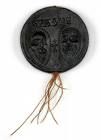



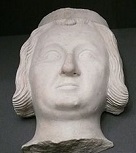
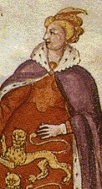



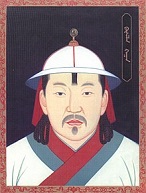

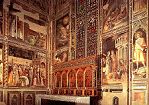
1328 Anyone for a cocktail? On Jan. 17 Louis IV the Bavarian (1282-1347) is crowned HRE by aged pope-slapping Ghibelline Roman senator Sciarra Colonna (b. 1270) ("captain of the Roman people") in Milan; in Apr. Louis IV declares "Jacque de Cahors" (Pope John XXII) in Avignon deposed for heresy, and on May 12 proclaims spiritual Franciscan Pietro Rainalducci as Antipope Nicholas V (1260-1333) (until July 25, 1330), becoming the last imperial antipope (set up by a HRE); Marsilius of Padua helps Louis IV with more good propaganda under imperial protection until his death in 1342. On Jan. 24 Edward III (b. 1312) of England marries Philippa d'Avesnes of Hainault (1311-69) at York Minster; she wisely decides not to Frenchify her court or retain her foreign retinue, and goes on to become known for her gentleness and compassion, and gives the definitely heterosexual Edward III 13 children, incl. 5 sons who survive to adulthood, incl.: #1 Edward the Black Prince of Wales (1330-76) (AKA Edward of Woodstock), #2 William of Hatfield (1336-7), #3 Lionel of Antwerp, Duke of Clarence (1338-68), #4 John of Gaunt, Duke of Lancaster (1340-99), #5 William of Windsor (1348-8), #6 Edmund de Langley, 1st Duke of York (1341-1402), and #7 (13th and last child) Thomas of Woodstock, 1st Duke of Gloucester (1355-97) (an ancestor of Edward Winslow of 1620 Mayflower fame) - thus are the dragon's seeds sown for the Wars of the Roses between the houses of York (white rose) and Lancaster (red rose)? On Feb. 1 king (since Jan. 3, 1322) Charles IV the Fair of France (b. 1294) dies without male heir, leaving only a useless woman, Blanche (his daughter through his wife Blanche of Burgundy, who marries Philip of Orleans and founds the House of Orleans), ending the direct line of the Capetian kings; after an assembly of barons declares that "no woman or her son could succeed to the monarchy", regent Count Philip of Valois, son of Count Charles of Valois (brother of Philip IV) and his wife Margaret of Anjou is crowned Philip VI (1293-1350) at Rheims, becoming the first French king of the Valois Dynasty (ends 1589), using the Salic Law to set aside rival claimants, particularly pesky Edward III; Louis X's only daughter Joan II of Navarre (1312-49), also prevented by the Sexalic er, Salic Law from becoming the monarch becomes queen of Navarre (where the Salic Law doesn't apply), renouncing her claims to the French throne as well as her lands in Brie and Champagne in return for extensive lands in Normandy (Angouleme, Mortain and Longueville) (later exchanging Angouleme for three estates in Vexin); free at last to help Louis of Nevers, Count of Flanders and avenge the 1302 Day of the Spurs, Philip VI sends his French troops to slaughter the whimpy Flemish burgers, er, burghers at the Battle of White Castle, then the less-white Aug. 23 Battle of Cassel 20 mi. S of Dunkirk, at which Charles IV is saved by Philip III of Navarre (the Noble) (the Wise) (1306-43), hubby of Joan II of Navarre; Charles V establishes a French admin. in Flanders, which pisses-off Edward III and leads to the Hundred Years' War (1337-1453). On Mar. 17 after English defeats cause Roger Mortimer to pressure Edward III into it, the Treaty of Edinburgh-Northampton is signed, recognizing Scottish independence and sovereignty in return for a £20K payment by Robert I, a promise of a royal marriage for Robert I's 4-y.-o. son David Bruce (future David II) (1324-71) to Edward III's 7-y.-o. sister (youngest daughter of Edward II and Isabelle, born in the Tower of London) Joan "of the Tower" Plantagenet (1321-62), and help in getting Robert's excommunication lifted; on May 4 the TOE is ratified at Northampton, and on June 12 the marriage takes place by proxy, followed by another marriage on July 17 at Berwick-upon-Tweed; Roger Mortimer declares himself the first earl of March and splits with the barons, attacking their leader Henry of bloody red rose Lancaster - what role did Isabelle play in all this? On Apr. 11 Adam Duff O'Toole of Leinster, Ireland is burned at the stake in Hogging (Hogges) Green near Dublin for blasphemy and heresy, although it was really for rebelling against the stankin' English? On Aug. 15 Yuan emperor #6 (since Oct. 4, 1323) Yesun Temur (Yuan Tai Ding Di) (b. 1293) dies, and on Oct. 4 is succeeded by his eldest son Ragibagh (Arigabag), who becomes Yuan Tian Shun (1320-8), but on Nov. 14 before he can be coronated he is dethroned by is succeeded by 24-y.-o. Tugh Temur (Jayaatu "lucky" Khan) (1304-32), who becomes Mongol Yuan emperor #7 of China, then abdicates after 1 mo. in favor of his elder brother Khoshila (Kusala), who on Feb. 27, 1329 becomes Khutughtu Khan (1300-29), Mongol Yuan emperor #8 of China Mingzong (until Aug. 30, 1329), who resigns on Aug. 30 in favor of Tugh Temur, who resumes the throne on Sept. 8, 1329 (until Sept. 2, 1332); Eretna Bey (-1352) becomes Mongol Ilkhanid rep. in Rum; the War of the Two Capitals begins, pitting the family dynasty based in Khanbaliq (modern-day Beijing) against the one based in the summer capital Shangdu, which ends in 1332 with a V for the Khanbaliq group after the most bloody and destructive succession struggle in Yuan history. On Aug. 23 the Battle of Cassel 18 mi. S of Dunkirk, France is a decisive V for 14.5K French soldiers led by Philip VI over 6.5K-8K Flemish independence rebels led by Nicolaas Zannekin, who lose 3,185 KIA. In Aug. the Gonzaga family, supported by Cangrande della Scala overthrows Passerino Bonacolsi in Mantua. On Sept. 10 Cangrande della Scala finally takes Padua after 16 years of trying when imperial vicar Henry III of Carinthia abandons it and the lawlessness causes Marsilio da Carrara to surrender it to him in return for a share of power; the big Ghibelline V causes Venice to make him a citizen next Mar. After accidentally killing his brother Manuel in 1320, causing their father Michael IX Palaeologus to die in grief and his grandfather Andronicus II Palaeologus to disown him, after which he flees to Thrace and proclaims himself emperor in Apr. 1321, starting the Byzantine Civil War of 1321-8 and forcing Andronicus II to make him co-emperor in Feb. 1325, Byzantine emperor (since 1282) Andronicus II Palaeologus resigns, and Andronicus III Palaeologus (Andronikos III Palaiologos) (1297-1341) becomes sole emperor (until June 15, 1341); next year he personally leads an expedition against the Ottomans under Orkhan I in Anatolia, and is defeated on June 10-11 at the Battle of Pelekanon near Nicomedia, causing the Byzantines to permanently abandon their cities in Anatolia. A great fire destroys much of Munich. Wang Dayuan (1311-) travels from Quanzhou, China along the South China Sea to South Asia, reching Singapore in 1330, Bengal, Sri Lanka, and India by 1333, and North Africa and East Africa in 1334-9; in 1339 he writes Daoyi Zhilue (A Brief Account of Island Barbarians), one of the first accounts of the history of Singapore. The North Sea port of Rotterdam on the Rotte River in SW Netherlands on the Rhine River delta (modern pop. 580K) is chartered. Architecture: The Alcazar de los Reyes Cristianos (Fortress of the Christian Kings) in Christian-held Cordoba, Spain is begun by order of Alfonso XI of Castile. Inventions: The sawmill is invented by ? - from sawing too many Templars in half and needing a labor-saving device? Nonfiction: Thomas Bradwardine, Tractatus Proportionum; attempts to explain how velocity is related to the two independent variables power and resistance in the analysis of motion. The first post-it notes are in the Bible? English chronicler Nicholas Trivet (Nicolas Trivetus) (1257-1334) pub. the first postil (postilla) (from Lat. "post illa verba textus"), a Biblical commentary affixed to a text, later evolving into a printed homily. Art: Taddeo Gaddi (1300-66), Decoration for the Baroncelli Chapel (1328-30), Santa Croce, Florence. Poetry: Don Juan Manuel (1282-1348), El Conde Lucanor (Count Lucanor) (1328-35); he does his uncle Alfonso X the Wise of Castile proud? Births: Bavarian Wittelsbach duke (1347-65) and Brandenburg margrave (1351-65) Louis VI/II (the Roman) (d. 1365) on May 7 in Rome; eldest son of HRE Louis IV the Bavarian (1282-1347) and Countess Margaret II of Hainault; younger half-brother of Louis V of Bavaria (1315-61). Chinese Ming emperor #1 (1368-98) Hong Wu (Chin. "vast military") (Zu Yuan Zhang) (d. 1398) on Oct. 21. English soldier Roger Mortimer, 2nd Earl of March (d. 1360) on Nov. 11; son of Sir Edmund Mortimer (-1331) and Elizabeth de Badlesmere; grandson of Roger Mortimer, 1st earl of March (1287-1330). Scottish leader "Black" Archibald (the Grim), 3rd Earl of Douglas (d. 1400); bastard son (by a Moorish mother?) of Sir James "the Black/Good" Douglas (1286-1330), deputy of Robert I the Bruce; cousin of William Douglas, 1st earl of Douglas (1327-84); father of James Douglas, 7th earl of Douglas (1371-1443). Deaths: Italian Catholic missionary (to China) John of Montecorvino (b. 1246) in Peking. Arab puritanical Muslim fundamentalist scholar Ahmad ibn Taymiyyah (b. 1263); revered by the 18th cent. Wahhabi movement. Greek Byzantine physician Johannes Zacharias Actuarius (b. 1275) in Constantinople; leaves the last great compendium of Byzantine medicine, incl. "De Methodo Medendi" (6 vols.), "De Urinis" (7 vols.), and "De Actionibus et Affectibus Spiritus Animalis, ejusque Nutritione" (2 vols.). Italian condottiero Castruccio Castracani (b. 1281) on Sept. 3. French Capetian (the last) king (1322-8) Charles IV (b. 1294) on Feb. 1.

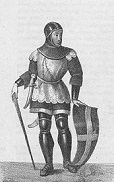

1329 Mt. Etna erupts, with a lava tongue going down into the sea. Early in the year HRE Louis IV the Bavarian leaves Rome, allowing Antipope (since 1328) Nicholas V to be deposed. In the spring Cangrande della Scala obtains the title of imperial vicar of Mantua from HRE Louis IV the Bavarian, then in July suspends his plans to conquer it from the Gonzagas in order to siege Treviso, triumphantly entering on July 18; too bad, he takes ill from drinking from a polluted spring, and the physicians feed him foxglove until he croaks on July 22; his brother Alboino's sons Mastino II della Scala (1308-51) and Alberto II della Scala (1306-52) succeed him as Scaliger lord of Verona (until 1351), later hanging one of his daddy's physicians. On June 7 after the pope finally recognizes Scotland and lifts his excommunication, and he grants the harbor of Leith on the S shore of the Firth of Forth to Edinburgh and makes a 1-mo. pilgrimage from Cardross through Clydeside to the Shine of St. Ninian at Whithorn Cathedral in Dumfries and Galloway (SW Scotland) to seek a cure, doing penance for five days, ailing 55-y.-o. Scottish king (since 1314) Robert I the Bruce (b. 1274) dies at Cardross Castle of leprosy (psoriasis?) (which he believes is God's judgment for killing John Comyn on a sacred altar in 1307, which causes him to grant large sums of money to abbeys in S Scotland), and is buried at Dumfermline Abbey in SW Fife with Templar ritual beside his 2nd wife Elizabeth de Burgh; on June 7 his young son (by Elizabeth) David II (1324-71) succeeds him as king of Scotland (until Feb. 22, 1371, his daddy telling him on his deathbed never to fight a pitched battle but to stick with guerrilla tactics; he receives a bottle of sacred oil from the pope for his coronation, but Edward III reneges on his promise to return the Stone of Scone; Thomas Randolph, 1st Earl of Moray (1278-1332) is appointed guardian, giving him his early schooling, which doesn't stop him from growing up to become incompetent?; Robert I's internal organs are interred at his instructions at St. Serf's Chapel (Inch Priory) near Dumbarton, with fellow Templar Sir James "Black" Douglas instructed to carry his "Braveheart" in a silver casket hung on his neck with a small Crusader party to bury it in the Holy Land; the disinherited Scottish nobles, led by Henry Beaumont, 4th Earl of Buchan (1279-1340) see their chance, and begin plotting to put Edward de Baliol, son of John Balliol on the Scottish throne. Edward III does homage for his French lands. If you want to know why central Europe's history is such a mixed-up mess, start here? HRE Louis IV's Compact (Treaty) of Pavia splits the Palatinate from Bavaria and its ruling House of Wittelsbach (founded 1119), returning it to the descendants of his nephews Rudolph II the Blind (1306-53) and Rupert I the Red (1309-90); in 1410 the Palatinate branch fractures into numerous branches; when the Roman Catholic-Protestant thingie comes along, the Upper Palatinate branch goes Protestant, and after an ass-kicking the Upper Palatinate is given back to the Roman Catholic Bavarian side in 1623; the two big branches are not reunited until 1777. Count (since 1323) Edward the Liberal (b. 1284) dies, and his younger brother (son of Amadeus V) Aymon the Peaceful (b. 1291) becomes count of Savoy (until June 22, 1343), earning his nickname by resolving the old territorial dispute with his cousin Amadeus III of Geneva; his niece Joan of Savoy is excluded from the succession by Salic Law, and contests it with the support of her hubby Duke John III of Brittany, but settles for a monetary payment after their marriage produces no heir; Aymon oes on to continue the old family feud with French dauphin Guigues VIII of Viennois until he is KIA at the Battle of La Perriere in 1333, after which Philip VI brokers a truce with the new dauphin Humbert III of Viennois, Guigues' brother. Pope John XXII sends Franciscan Order master-gen. (since 1329) Gerard Odon (Geraldus or Gerardus Odonis) (Guiral Ot) (1285-1349) to meet with Charles I of Hungary and Stephen II of Bosnia to urge them to exterminate heretics, esp. the pesky Manichaean dualist Patarenes (Bogomils). Births: English soldier Roger Mortimer, 2nd Earl of March, 4th Baron Mortimer (d. 1360) on Nov. 11; son of Sir Edmund Mortimer (-1331) and Elizabeth de Badlesmere; grandson of Roger Mortimer, 1st earl of March (1287-1330). Deaths: Scottish king (1314-29) Robert I the Bruce (b. 1274) on June 7 in Cardross Castle. French duke of Lorraine (1312-29) Frederick IV (b. 1282) on Apr. 21 (KIA in the Battle of Cassel). Italian condottiero Cangrande della Scala (b. 1291) on July 22 in Treviso (poisoned); buried in the new Gothic Scalinger Tombs, known for the richly-harnessed big dogs, later housing his downline. Chinese Mongol great khan #13 (1329) Khutughtu Khan Kusala (Mingzong) (b. 1300) on Sept. 30 in Onggatchu, Inner Mongolia; dies four days after a banquet with Tugh Temur (poisoned?), who is restored to the throne on Sept. 8.